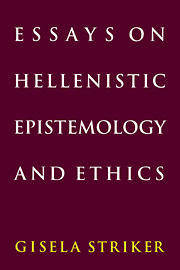Book contents
- Frontmatter
- Contents
- Preface
- Acknowledgments and essay sources
- List of abbreviations: Frequently cited names and titles
- EPISTEMOLOGY
- 1 Methods of sophistry
- 2 Kριτήριον τῆς ἀληθείας
- 3 Epicurus on the truth of sense impressions
- 4 Sceptical strategies
- 5 The Ten Tropes of Aenesidemus
- 6 On the difference between the Pyrrhonists and the Academics
- 7 The problem of the criterion
- ETHICS
- Name index
- Index of passages cited
7 - The problem of the criterion
Published online by Cambridge University Press: 05 June 2012
- Frontmatter
- Contents
- Preface
- Acknowledgments and essay sources
- List of abbreviations: Frequently cited names and titles
- EPISTEMOLOGY
- 1 Methods of sophistry
- 2 Kριτήριον τῆς ἀληθείας
- 3 Epicurus on the truth of sense impressions
- 4 Sceptical strategies
- 5 The Ten Tropes of Aenesidemus
- 6 On the difference between the Pyrrhonists and the Academics
- 7 The problem of the criterion
- ETHICS
- Name index
- Index of passages cited
Summary
Towards the end of the fourth century B.C., Greek epistemology appears to undergo some dramatic changes. New technical terms are introduced by Epicurus and the Stoic Zeno, indicating a shift of interest from the question ‘What is knowledge?’ – given that there is such a thing – to ‘Is there any knowledge?’. The appearance of novelty may be due to the fact that so much of the philosophical literature of the fourth century is lost. There must have been a sceptical undercurrent from the time of the sophists on, most notably perhaps in the Democritean school. But we have to turn mainly to Plato and Aristotle to recover some of the evidence, and it seems that they had little patience with doubts about the possibility of knowledge. Seeing impressive disciplines like mathematics, astronomy, medicine and other natural sciences develop, they may have found it unnecessary to worry about their very possibility, and more important to investigate the structure of scientific theories and the characteristics of scientific understanding. They may also have thought that their doctrines, which tied knowledge to the universal, were not liable to the difficulties arising from conflicting appearances.
But the fourth century also produced Pyrrho, later seen as the founder of scepticism, by whom Epicurus, who belonged to the Democritean tradition anyway, is said to have been much impressed (Diogenes Laertius (D.L.) IX. 64).
- Type
- Chapter
- Information
- Essays on Hellenistic Epistemology and Ethics , pp. 150 - 166Publisher: Cambridge University PressPrint publication year: 1996
- 3
- Cited by



